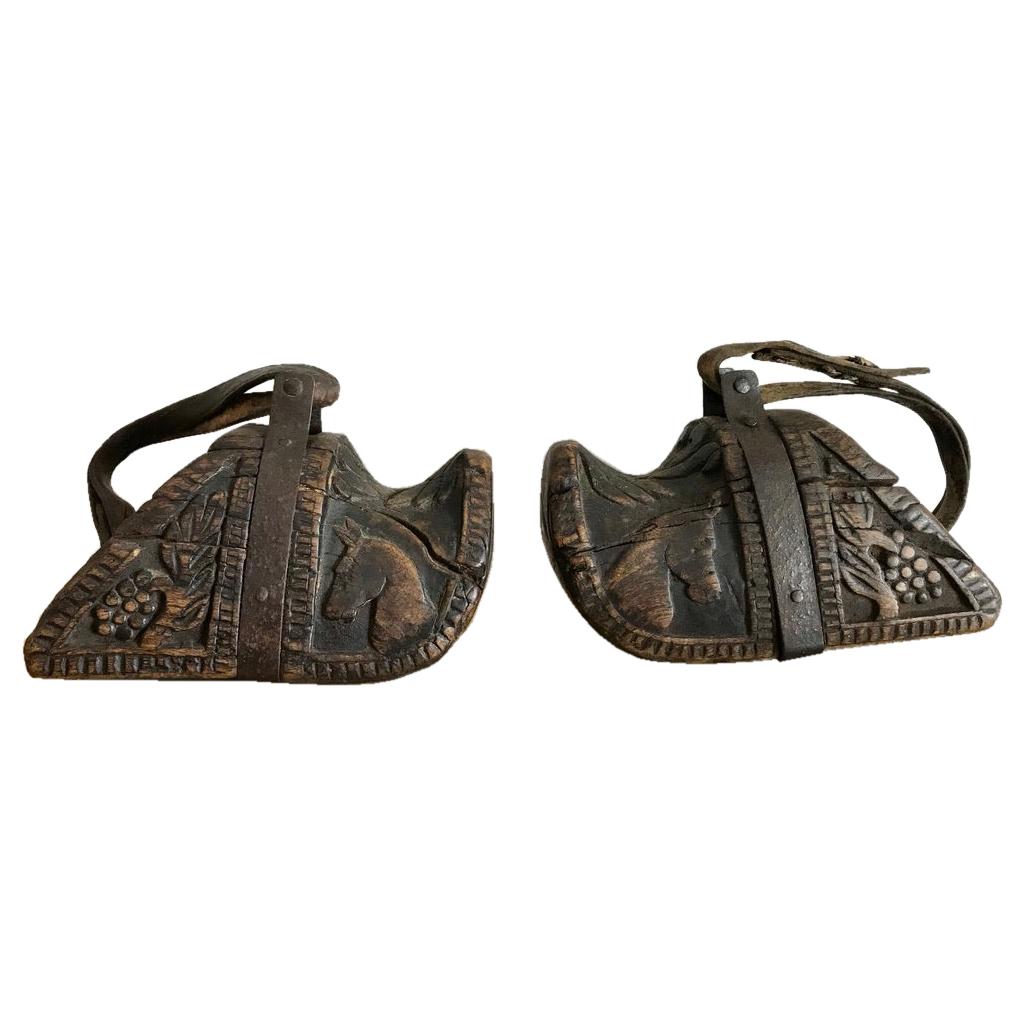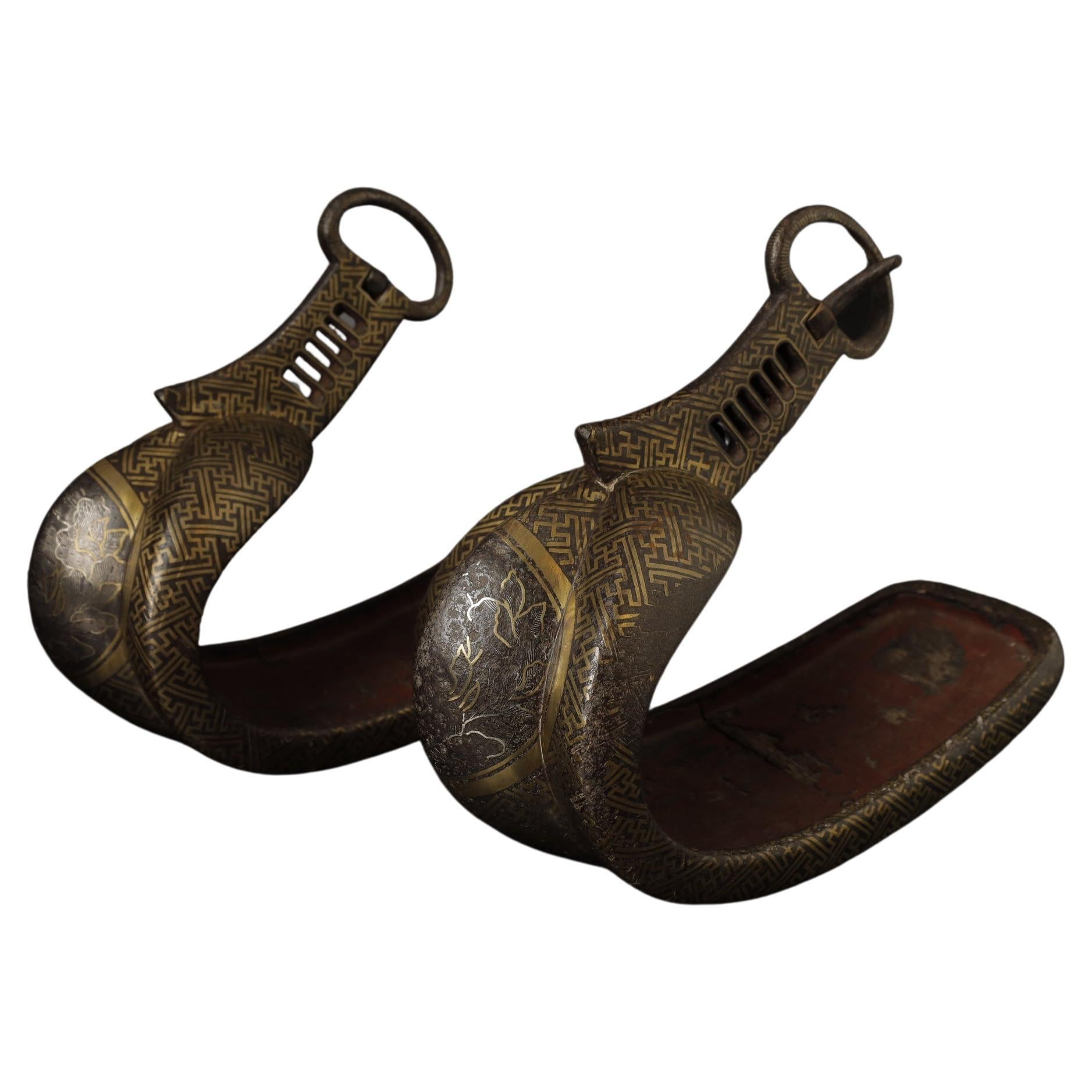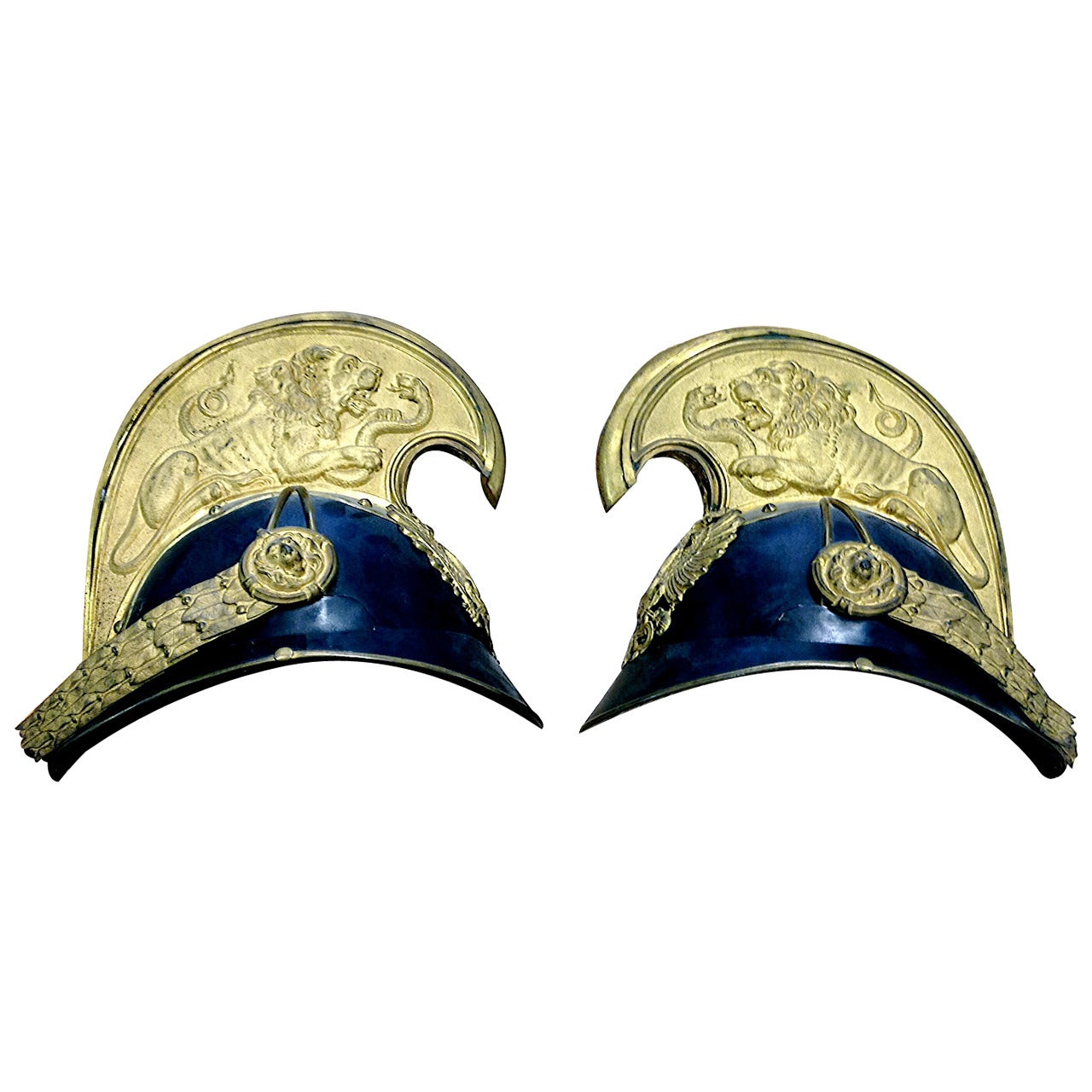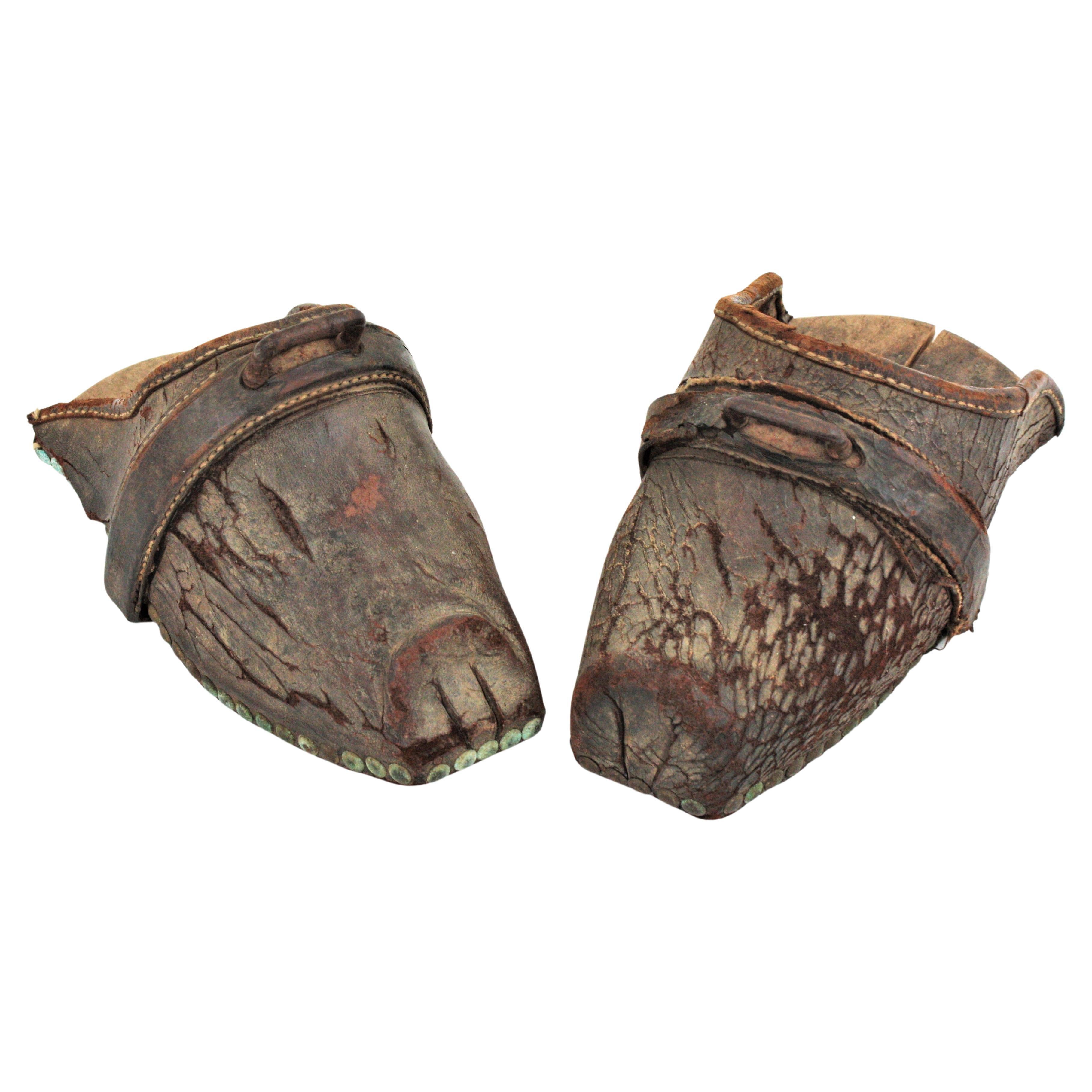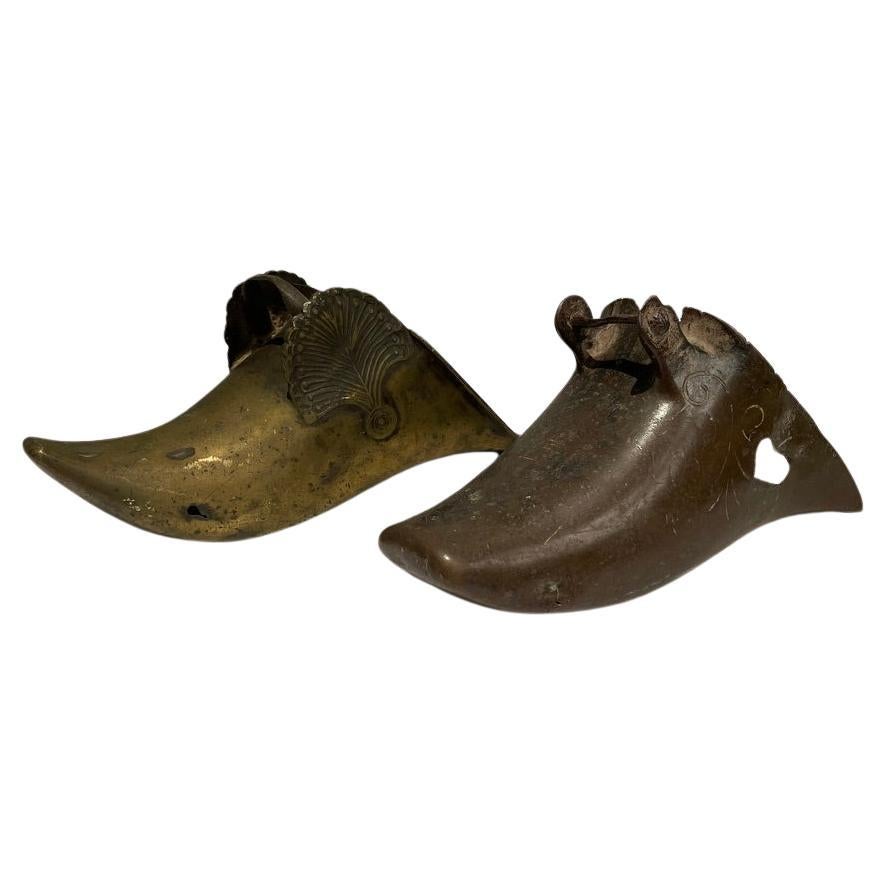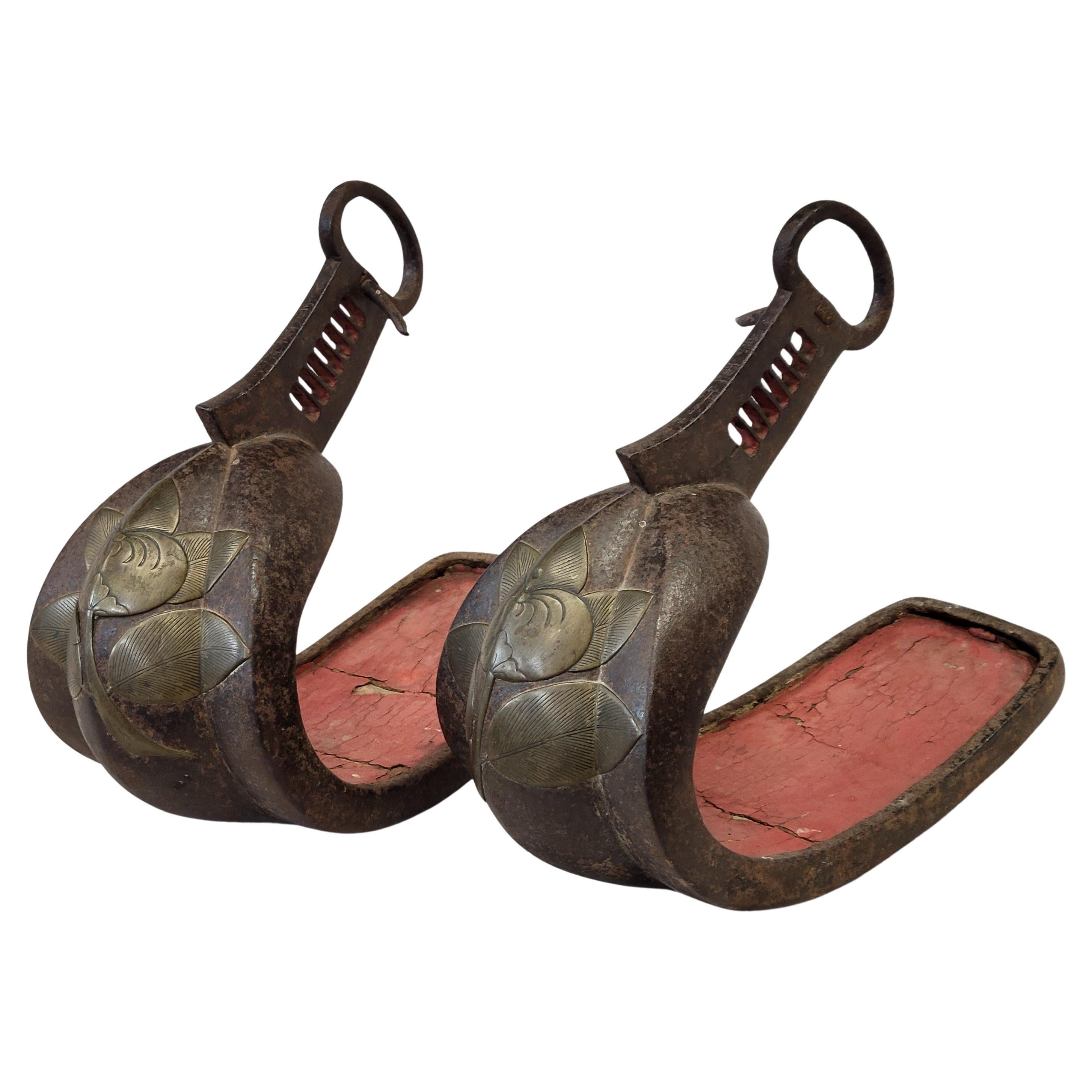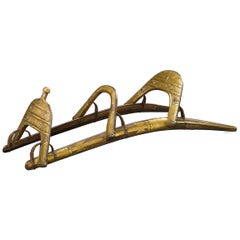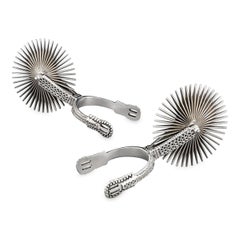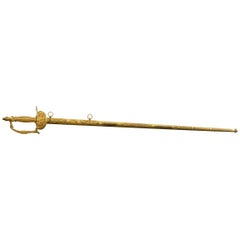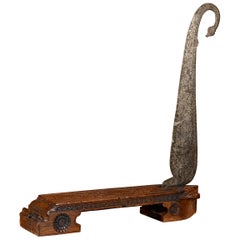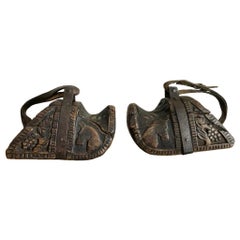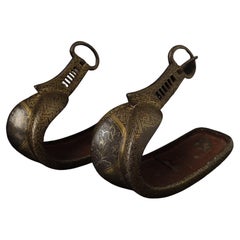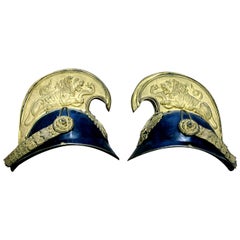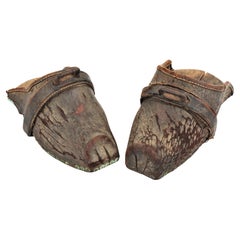Items Similar to 19th Century Chilean Huaso Stirrups
Want more images or videos?
Request additional images or videos from the seller
1 of 5
19th Century Chilean Huaso Stirrups
$14,850
£11,408.71
€13,108.47
CA$20,888.36
A$23,467.14
CHF 12,261.62
MX$286,427.44
NOK 155,686.73
SEK 146,546.26
DKK 97,820.30
About the Item
This striking and rare pair of Chilean wooden stirrups are true gems. Also known as estribos, these stirrups are carved from a solid block of wood. Taking the shape of the toes of boots, the stirrups are adorned with an intricate pattern. Steel stirrup rings inlaid with silver complement the complex motif of these sturdy footholds. Worn by Chilean huasos, or countrymen that are also highly skilled horsemen (similar to North American "cowboys"), these stirrups are a traditional part of huaso attire that can still be seen today. Huasos are primarily found in central and southern Chile, where they continue the rich custom of the Chilean rodeo.
19th century
Measures: 6" wide x 8" length x 7" high.
- Dimensions:Height: 7 in (17.78 cm)Width: 8 in (20.32 cm)Depth: 6 in (15.24 cm)
- Style:Other (In the Style Of)
- Materials and Techniques:
- Place of Origin:
- Period:
- Date of Manufacture:19th Century
- Condition:
- Seller Location:New Orleans, LA
- Reference Number:Seller: 30-18241stDibs: LU891110613521
About the Seller
5.0
Recognized Seller
These prestigious sellers are industry leaders and represent the highest echelon for item quality and design.
Established in 1912
1stDibs seller since 2010
110 sales on 1stDibs
Typical response time: 4 hours
- ShippingRetrieving quote...Shipping from: New Orleans, LA
- Return Policy
Authenticity Guarantee
In the unlikely event there’s an issue with an item’s authenticity, contact us within 1 year for a full refund. DetailsMoney-Back Guarantee
If your item is not as described, is damaged in transit, or does not arrive, contact us within 7 days for a full refund. Details24-Hour Cancellation
You have a 24-hour grace period in which to reconsider your purchase, with no questions asked.Vetted Professional Sellers
Our world-class sellers must adhere to strict standards for service and quality, maintaining the integrity of our listings.Price-Match Guarantee
If you find that a seller listed the same item for a lower price elsewhere, we’ll match it.Trusted Global Delivery
Our best-in-class carrier network provides specialized shipping options worldwide, including custom delivery.More From This Seller
View AllRegiment Des Dromedaires Camel Saddle
Located in New Orleans, LA
This fascinating piece of military history is a camel saddle created for and used by the Dromedary Regiment (Regiment des Dromedaires) during Napoleon’s Egyptian campaigns between 1798-1801. The term “dromedary” refers to the dromedary camel...
Category
Antique Late 18th Century French Empire Historical Memorabilia
Materials
Silver, Brass, Iron
19th Century Chilean Huaso Spurs
Located in New Orleans, LA
This rare and authentic pair of Chilean spurs is stunning to behold. Traditionally worn by huasos, or Chilean cowboys, these silvered steel spurs, or esp...
Category
Antique 19th Century Chilean Other Arms, Armor and Weapons
Materials
Steel
South American Presentation Sword
Located in New Orleans, LA
Believed to have originated from the collection of a South American diplomat, the exquisiteness of this presentation sword conveys its ownership by ...
Category
Antique 19th Century South American Other Arms, Armor and Weapons
Materials
Steel, Brass, Bronze
$48,500 / set
Indian Arivalmanai Culinary Cutting Tool
Located in New Orleans, LA
Originating from the Kerala region of Southern India, this 19th century arivalmanai, or culinary cutting instrument, is a traditional tool used in the preparation of vegetables throughout India. Comprising an engraved steel blade mounted upon a carved wood base, the user would place their weight on the wooden base by either sitting or kneeling, and prepare their ingredients accordingly. The craftsmanship and size of this fascinating relic denotes its usage in a Hindu temple setting, as offering food to the deities is believed to direct the mind towards spirituality.
Food plays an important role in Hindu worship, and because of the veneration of the cow and belief in non-violence, most followers follow a vegetarian diet. The vast majority of Hindu religious...
Category
Antique 19th Century Indian Other Butcher Blocks
Materials
Steel
18th-Century French Master’s Lock
Located in New Orleans, LA
French Master’s Lock
18th Century
Ingeniously crafted with a hidden mechanism, this 18th-century French lock, known as a serrure de maîtrise, or master’s lock, was likely used by sa...
Category
Antique 18th Century French Historical Memorabilia
Materials
Iron
Edo Period Samurai Suit Of Armor
Located in New Orleans, LA
This exquisite Tetsusabiji Uchidashi Gomai Dou Gusoku (Five-Plate Russet Iron Embossed Cuirass Armor), crafted in the 18th century, exemplifies the pinnacle of Edo-period samurai arm...
Category
Antique 18th Century Asian Edo Arms, Armor and Weapons
Materials
Copper, Iron
$188,500
You May Also Like
18th Century Spanish Colonial Carved Wood and Iron Stirrups
Located in Stamford, CT
Pair of late 18th early 19th century South American carved wooden stirrups. Known as estribos, each are carved from a solid block of wood. Decorated with wonderful carvings of horse heads and grape vines, these are truly charming pieces. With wrought iron stirrup rings and the original leather straps. Rich chocolate patina that only comes from age and use. Worn by Chilean huasos, highly skilled horsemen akin to America's cowboys.
Prized by collectors of horse memorabilia...
Category
Antique 1790s Chilean Spanish Colonial Sculptures and Carvings
Materials
Wood
$2,360 Sale Price
20% Off
Edo Period Spectacular Samurai Abumi, Stirrups Inlayed with Silver
Located in Fukuoka, JP
Spectacular Samurai Stirrups
These spectacular samurai stirrups are a fine example of Japanese craftsmanship. They are made of iron with silver and b...
Category
Antique 18th Century Japanese Edo Arms, Armor and Weapons
Materials
Silver, Bronze
19th Century Austrian Helmet
Located in Buchanan, MI
Handsome 19th century Austrian helmet.
Helmet has been separated into two parts so they can be flush mounted to a wall.
Category
Antique 19th Century European Arms, Armor and Weapons
Materials
Metal
$1,800 / set
Antique Spanish Riding Clog Stirrups in Wood and Leather
Located in Barcelona, ES
Clog Stirrups in Leather and Wood, Spain, 1930s-1940s.
Originally used for riding horses by spanish cattle herders
Interesting for decorative purposes.
Terrific aged patina.
Meas...
Category
20th Century Spanish Rustic Sports Equipment and Memorabilia
Materials
Iron
Two 19th Century Spanish Colonial Brass Slipper Stirrups
Located in Stamford, CT
Two great examples of 18th century Spanish Colonial slipper stirrups. Not a pair, each similar yet different. One is brass with a lovely floral decoration, the other a rare copper type with a simple incised design. Both with a wonderful patina that only comes with real age and use. These definitely put in some serious miles. Possibly used in battle, or just to protect the rider from bramble. Imagine what these pieces of history may have witnessed. Unique gift for the equestrian or collector of horse memorabilia...
Category
Antique Mid-18th Century Peruvian Spanish Colonial Arms, Armor and Weapons
Materials
Brass, Copper
Antique Edo Period Japanese Samurai Iron Stirrups with Brass or Bronze Inlay
Located in Centennial, CO
A pair of antique Edo period (1603–1867) Japanese Samurai Abumis (stirrups for horseback-riding) expertly crafted out of cast iron with brass or bronze inlay in the form of a stylize...
Category
Antique 18th Century Japanese Edo Metalwork
Materials
Brass, Bronze, Iron
